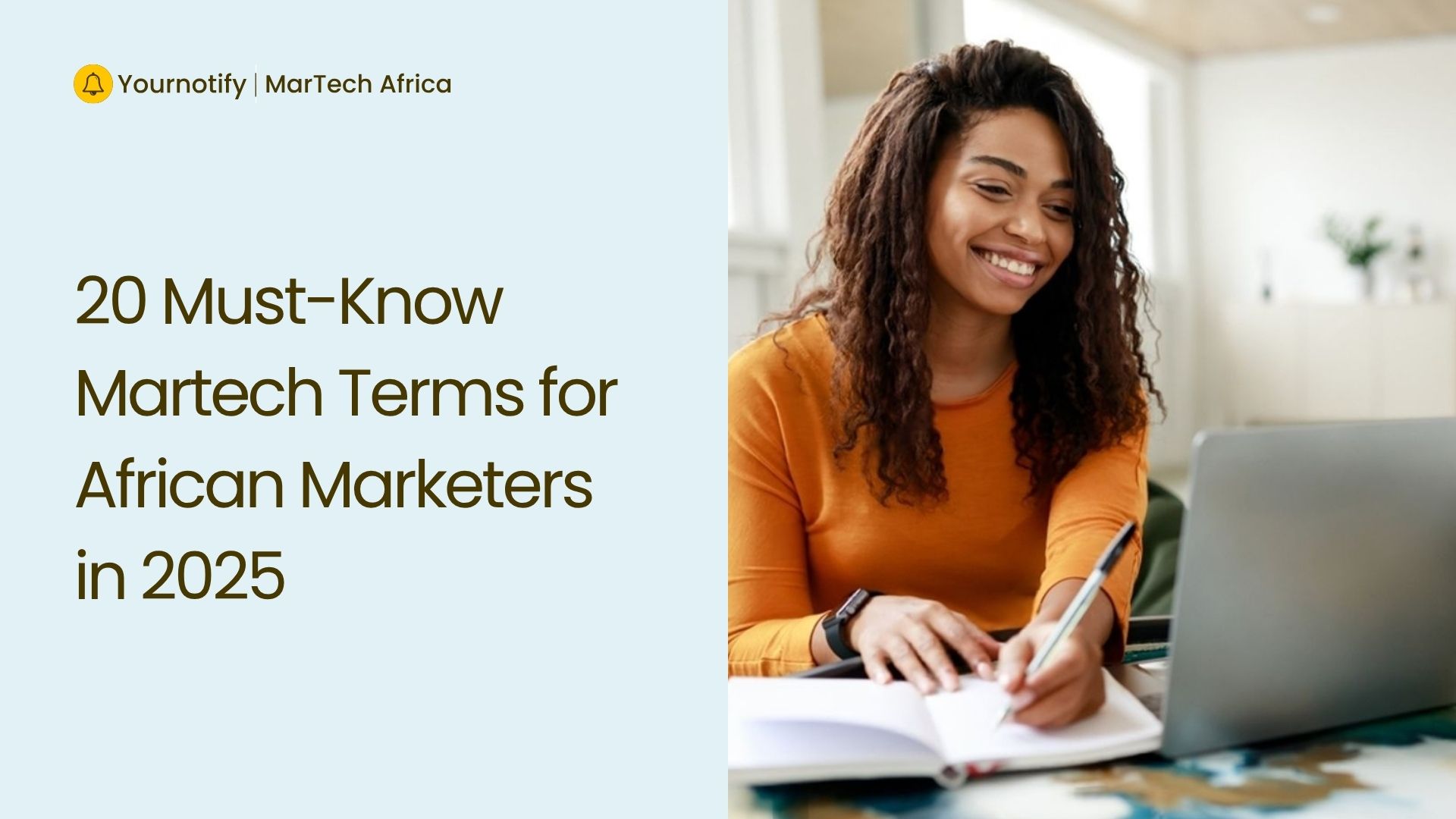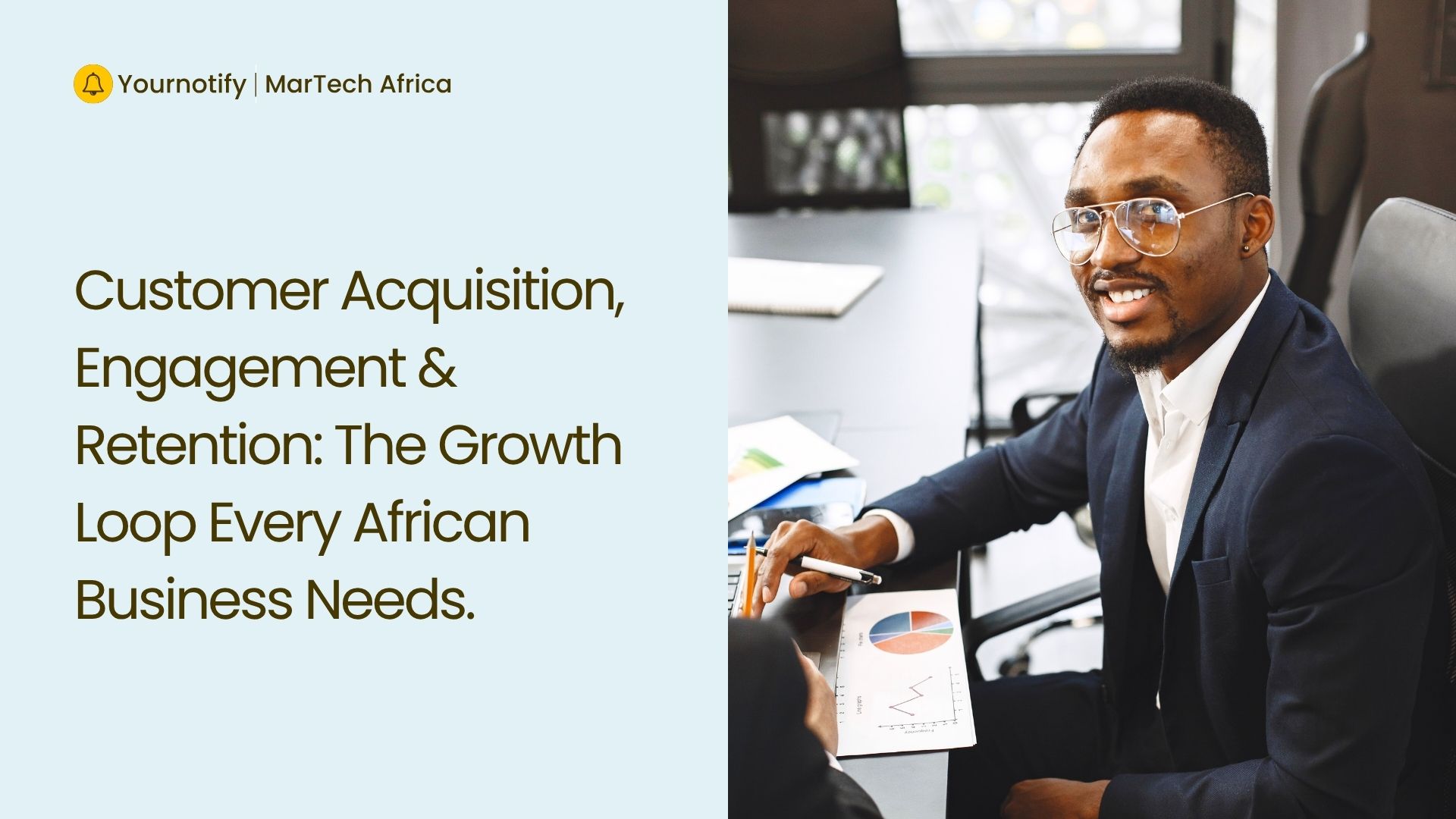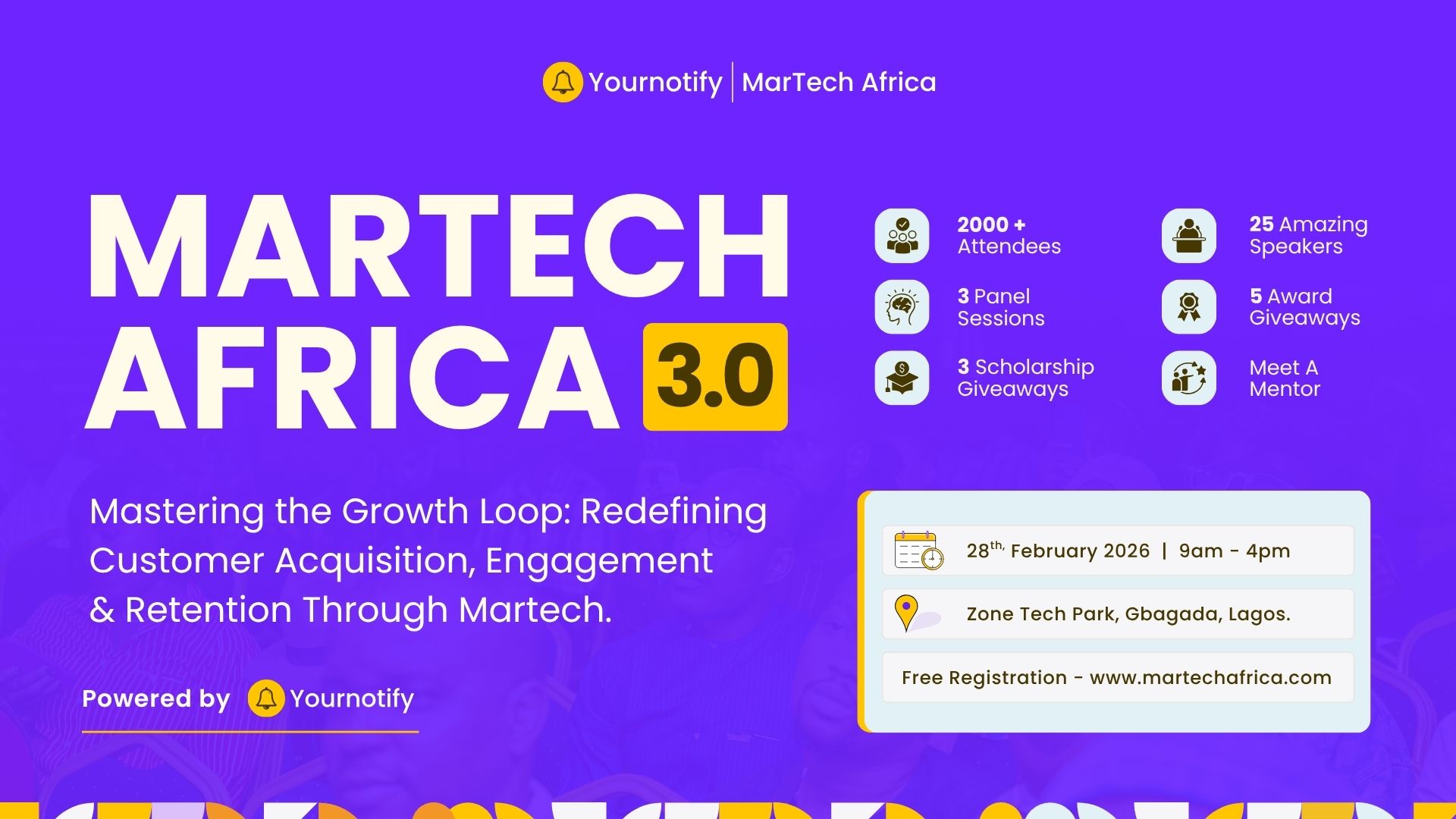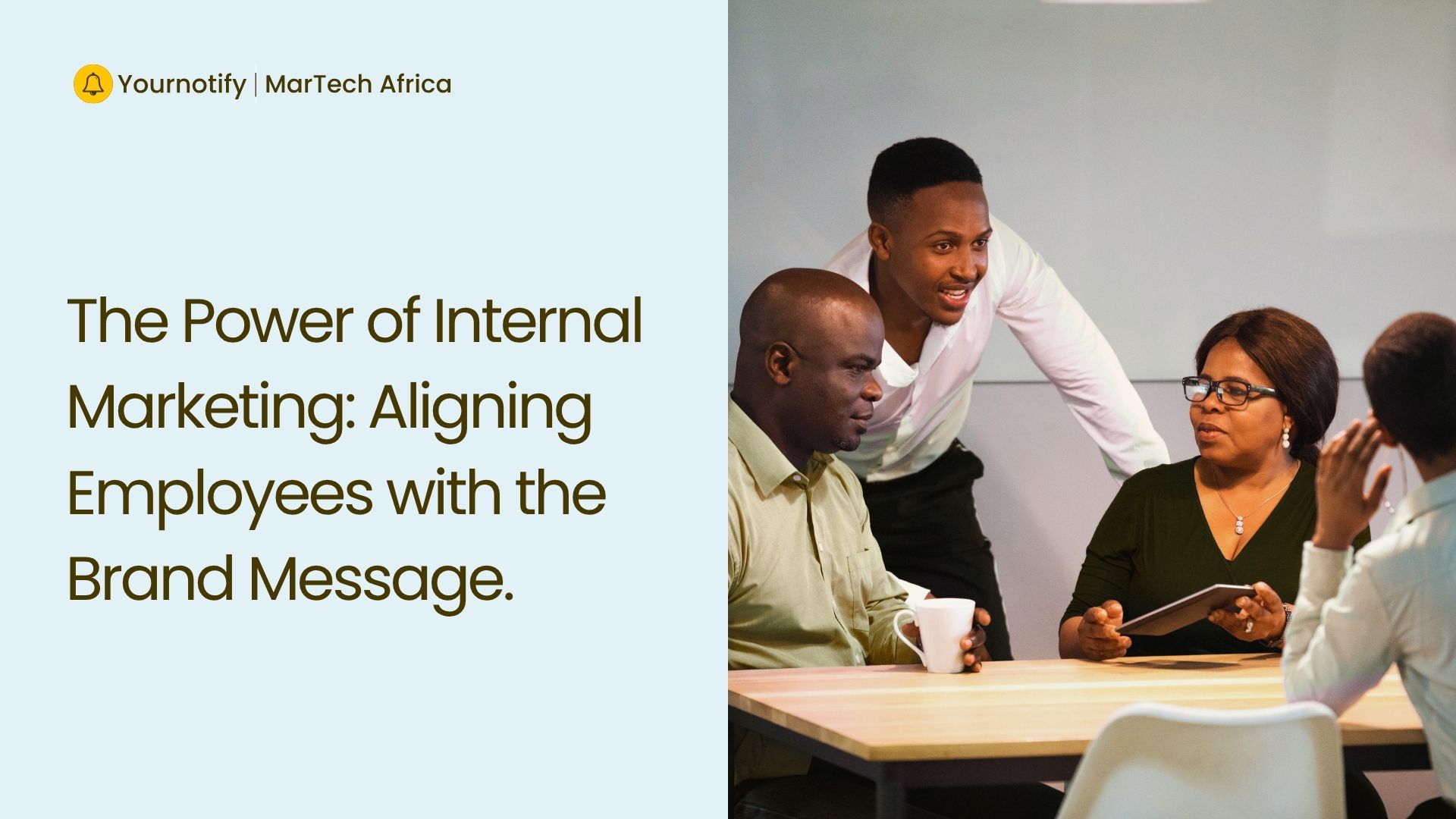For many African businesses, growth has traditionally been viewed as a linear journey: attract customers,…

20 Must-Know Martech Terms for African Marketers in 2025
The world of marketing is evolving rapidly, and nowhere is this shift more dynamic than in Africa. With mobile adoption at record highs and digital-first businesses growing across the continent, African marketers are increasingly blending creativity with technology to drive results. As marketers also, staying current with the latest trends and buzzwords is part of the job. Even as a seasoned pro or just starting out, it can be challenging to keep up with evolving industry jargon.
That’s why we compiled a list of 20 key marketing technology terms that you should know.
20 Martech Terms that for African Marketer
1. Customer Data Platform (CDP)
A Customer Data Platform is a centralized system that gathers customer data from multiple touchpoints such as apps, websites, emails, and offline interactions and then merges it into a single customer profile. For African marketers, especially those in fintech or retail, CDPs offer an edge by enabling personalized messaging based on unified data. For example, a digital bank in Nigeria can use a CDP to track a customer’s app activity, transaction history, and support chats which will enable them serve targeted offers across the different products or services they have via SMS or email.
2. Customer Relationship Management (CRM)
CRM refers to software that manages and nurtures customer relationships throughout the buyer journey. It stores contact information, interaction history, purchase behavior, and even preferences. In Africa, where many small businesses still rely on spreadsheets or WhatsApp, CRMs offer scalability and structure. A real estate agency in Accra might use a CRM to track client inquiries, schedule follow-ups, and send automated updates on new property listings.
3. Marketing Automation
Marketing automation is the use of software to perform repetitive marketing tasks without manual effort. This includes scheduling social posts, sending drip email campaigns, and retargeting ads. For lean African marketing teams, automation helps them work efficiently. Take a fashion brand for instance, instead of manually emailing every customer who abandoned a cart, the system sends a reminder automatically, possibly with a discount incentive.
4. Attribution Model
An attribution model determines which marketing channels or touchpoints deserve credit for a conversion. For instance, did a customer buy because of an Instagram ad, a Google search, or a newsletter? In Africa’s multichannel environment, attribution models help marketers understand where to invest. A digital service provider could use last-click attribution to see that most paid signups occur after a WhatsApp broadcast message, not a blog post.
5. Programmatic Advertising
Programmatic advertising is the automated buying and selling of online ad space using software, rather than manual insertion orders. It uses real-time bidding, data, and algorithms to target the right users. As African digital advertising grows, this allows brands like MTN or Safaricom to optimize ad spend and reach segmented audiences at scale across mobile, desktop, or OTT platforms.
6. A/B Testing
A/B testing is a method of comparing two versions of a marketing asset such as an email, landing page, or ad to see which performs better. Marketers test one variable (like a call-to-action button) while keeping everything else constant. African edtechs, for example, can test two versions of a student onboarding email to see which version gets more students to activate their accounts or sign up for a course.
7. Conversion Rate Optimization (CRO)
CRO is the process of improving your website or marketing assets to increase the percentage of users who take a desired action depending on the desired goal of the business. These could include signing up, clicking a link, or making a purchase. African ecommerce brands like Jumia or small DTC businesses use CRO techniques such as improving mobile responsiveness, simplifying checkout flows, or adding urgency-driven copy to boost sales.
8. Customer Journey Mapping
Customer journey mapping is a visual exercise that outlines every interaction a user has with your brand right from the first awareness to post-purchase engagement. It helps marketers identify friction points and optimize experiences. A pan-African fintech app might map a user journey from seeing a Facebook ad to downloading the app to failing to complete KYC and then tweak that onboarding flow.
9. Personalization Engine
A personalization engine uses data and algorithms to tailor content, recommendations, or messages for individual users. For African brands, this means showing customers content that reflects their behavior, location, or past purchases. A fashion site might display different product suggestions to a first-time visitor from Abuja versus a returning customer from Lagos.
10. Lead Scoring
Lead scoring is the process of assigning value (a score) to potential customers based on their likelihood to convert. This is usually done using behavioral data such as email opens, page visits, or demo requests. A B2B SaaS startup might use lead scoring to prioritize sales calls, focusing on users who downloaded a whitepaper and attended a webinar, rather than just repeatedly send newsletters to subscribers.
11. Data Management Platform (DMP)
A DMP collects, organizes, and segments anonymous data from multiple sources, mainly for digital advertising. It helps build audience segments for more accurate ad targeting. Digital agencies in Africa use DMPs to help clients run more precise and effective campaigns. For example, targeting Lagos residents interested in luxury travel during festive seasons.
12. Retargeting
Retargeting involves showing ads to users who’ve previously interacted with your brand but didn’t convert. It’s especially powerful in Africa where many users browse on mobile but delay purchases. A food delivery platform might use retargeting to display an ad on Facebook to users who viewed the menu but exited before placing an order.
13. Lookalike Audience
Lookalike audiences are created by advertising platforms (like Meta or Google) to help you reach new users who resemble your existing customers. For African marketers with limited first-party data, this is a cost-efficient way to scale. A skincare brand could upload its top 500 buyers to Facebook and run ads to people with similar characteristics across Nigeria.
14. First-Party Data
First-party data is information you collect directly from your audience such as email addresses, website behavior, or purchase history. As privacy laws evolve globally and in Africa, this data is becoming more valuable than ever. Brands that rely less on third-party cookies and more on owned data (like email lists) will be better equipped to run personalized, consent-driven marketing.
15. Customer Lifetime Value (CLTV or LTV)
Customer Lifetime Value is the estimated revenue a customer generates during their entire relationship with a business. African subscription services like meal plans, digital learning and other subscription based services use LTV to decide how much they can afford to spend on acquiring a customer. The higher the LTV, the more budget a brand can allocate toward marketing.
16. Engagement Rate
Engagement rate measures how actively users interact with your content using criteria such as likes, shares, comments, saves, clicks, etc. For African creators, influencers, and content brands, this is often more important than follower count. A 10,000-follower page with 2,000 comments might have higher engagement (and value) than a 100K page with 20 likes per post.
17. Growth Marketing
Growth marketing goes beyond awareness and focuses on the entire funnel, following a structured process tagged acquisition, retention, referral, and revenue. It involves rapid experimentation and data-driven iteration. African startups like Eden Life or AltSchool Africa use growth tactics like referral programs, product-led loops, and lifecycle emails to fuel user growth.
18. Search Engine Optimization (SEO)
SEO involves optimizing your website content so it ranks higher on search engines like Google. African brands use SEO to appear when users search for local services or products. A fintech blog targeting “how to save money in Ghana” or “best investment apps in Nigeria” can gain organic traffic and build brand trust without paid ads.
19. Heatmaps
Heatmaps are visual tools that show where users click, scroll, or linger on your website or app. This helps identify which areas are attracting attention and which are being ignored. A Nigerian edtech platform might use heatmaps to discover that students are missing key buttons, prompting a redesign to improve accessibility and conversion.
20. Chatbot
Chatbots are automated programs that simulate human conversation via chat. They’re often used for customer service, FAQs, or even sales. In Africa where 24/7 customer service can be expensive, chatbots on WhatsApp or websites allow banks, ecommerce platforms, and telcos to assist users in multiple languages without hiring large support teams.
Marketing in recent times is heavily reliant on strategic use of technology to drive meaningful results. The marketers leading this transformation are the ones who understand not just what martech tools exist, but how to apply them in a uniquely to the different context.
Related Content


